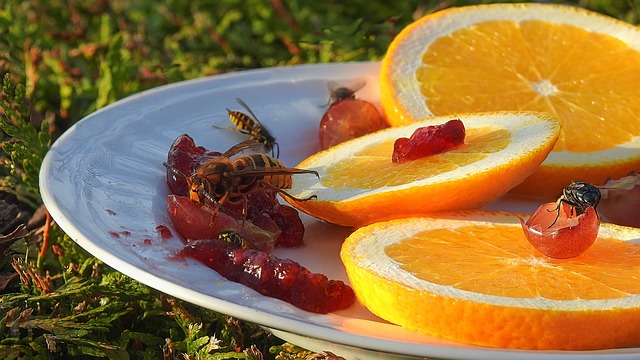Hornet nests, common in various habitats, pose a significant nuisance due to their aggressive defense. These visible, bustling spheres are particularly active during the day and often attract people engaging in outdoor activities. As people spend more time indoors, professional hornet control services have become vital for safe living and working environments. These experts offer eco-friendly prevention techniques, safe extermination, and prompt response times, addressing issues before they escalate and minimizing risks to occupants and wildlife. Many opt for eco-friendly hornet nest prevention and removal services over traditional chemical methods, making it wise to seek professional help for effective, safe, and tailored solutions.
Hornet nests can pose a significant risk to homes and businesses, with their aggressive behavior and potential for stings. Understanding these insects’ habits is the first step towards effective prevention. This article guides you through everything from recognizing common habitats to exploring eco-friendly methods and seeking professional help for safe hornet nest removal. Whether you’re looking for residential or commercial hornet nest control, these insights will empower you to mitigate risks and maintain a secure environment.
Understanding Hornet Nests: Behavior and Common Habitats
Hornet nests are complex structures, often built high up in trees, attics, or even within wall cavities. These social insects live in organized colonies with a queen at their helm. The nests can grow to remarkable sizes, becoming visible as bustling, humming spheres. Hornets are aggressive defenders of their territory and will sting intruders without hesitation. They’re particularly active during the day, making them a common nuisance for both homes and businesses.
Common habitats include areas with abundant wood, such as tree trunks or old wooden structures, as hornets prefer to build nests in dry, hollow spaces. They are also attracted to human activities—garden tools left out, outdoor furniture, or even construction sites—making it crucial for property owners to take preventive measures. Professional hornet control services offer effective solutions like hornet nest removal near me, eco-friendly prevention techniques, and safe extermination to ensure these invasive insects don’t disrupt your peace of mind.
The Importance of Professional Hornet Control for Homes and Businesses
In today’s digital era, as folks increasingly spend time indoors, the presence of hornets in and around homes and businesses has become a growing concern. Hornets are not just a nuisance; they can pose significant health risks due to their stings, which may trigger severe allergic reactions. Professional hornet control is essential for maintaining safe and comfortable living and working environments.
Hiring expert hornet nest prevention services ensures effective residential or commercial hornet prevention. These professionals employ eco-friendly hornet prevention methods and safe hornet nest removal techniques, minimising risks to occupants and local wildlife. Unlike DIY approaches, professional hornet extermination services have the knowledge and tools to target nests accurately, preventing future infestations. With these services readily available near you, it’s wise to address hornet issues promptly to enjoy a pest-free space.
Eco-Friendly Prevention Methods: A Safe Approach to Hornet Nest Removal
Many homeowners and business owners prefer a more natural approach to hornet nest prevention and removal, opting for eco-friendly methods that are both safe and effective. This method involves using specialized knowledge and tools to implement preventive measures without resorting to harmful chemicals or pesticides. Professional hornet control experts can assess your property and identify potential nesting sites, then employ strategies such as sealing entry points, removing food sources, and using mechanical traps.
By choosing eco-friendly hornet prevention, you benefit from a safe and humane approach that also protects the environment. These methods are especially beneficial for those looking for residential or commercial hornet nest control near them, ensuring that any nests removed won’t be replaced by new ones. This sustainable strategy not only keeps your space free from these insects but also promotes a balanced ecosystem.
Effective Hornet Extermination Services: When and How to Seek Help
When dealing with hornet nests on your property, seeking professional help is often the best course of action. Hornet nest prevention services are designed to address the issue before it becomes a significant problem, ensuring safety and effectiveness. These experts have the necessary tools and knowledge to identify and locate nests, especially in hard-to-reach areas. They employ eco-friendly hornet prevention methods that minimize environmental impact while providing safe hornet nest removal.
Commercial hornet nest control is crucial for businesses, as these insects can cause disruptions and pose health risks. Residential hornet prevention services are equally vital to protect homes and their occupants from potential stings. If you notice a hornet nest nearby, don’t delay; reach out to local hornet extermination services that specialize in quick response times. They will assess the situation, offer solutions tailored to your needs, and eliminate the nest safely, ensuring peace of mind for you and your surroundings.
When faced with a hornet nest on your property, whether it’s your home or business, it’s crucial to call in professional help for effective and safe hornet extermination services. While DIY methods can be tempting, especially for eco-friendly prevention, the risk of stings and the potential for nests to reappear quickly make professional hornet control essential. With specialized knowledge and tools, experts provide both residential hornet prevention and commercial hornet nest control solutions. Remember, a safe and thriving environment is possible with the right hornet nest removal near me services, ensuring your peace of mind and eliminating potential hazards associated with these insects.
